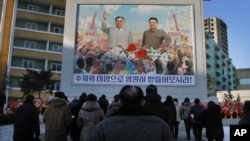A new report by a South Korean human rights organization details abuses suffered by North Korean workers who are sent to work outside the country, but still often live in harsh, prison-like conditions.
The group said the Kim Jong Un regime confiscates 90 percent of the workers' wages, bringing in billions of dollars for a government that is subjected to tough international sanctions.
The Database Center for North Korean Human Rights in Seoul based its report on interviews with 20 North Korean defectors, most of whom were dispatched to work in nine countries, including China, Russia and Kuwait.
One defector described the experience of working abroad as “harsher than the life in prison camps in North Korea.”
Lack basic living necessities
Lee Sung-joo, a researcher with the group, said workers often lack even basic living necessities. She said the workers are living in shelters or containers where water and heating or cooling systems are not provided.
South Korea’s foreign ministry estimated North Korea has dispatched about 50,000 laborers to 40 countries. They are often employed to do demanding manual labor, working 15 hours a day in factories, farms, lumber camps and construction sites.
The defectors interviewed said their wages were paid directly to the North Korean government. The workers would then receive only 10 percent of the salary they earned.
The group’s analysts estimated the practice generates more than $2 billion a year for the North Korean state.
Jung Jae-ho, a researcher who worked on the report, said this revenue eases the pain of international sanctions imposed on Pyongyang for its nuclear weapons program.
He said North Korea dispatched its laborers to foreign countries to obtain governing funds for the regime while blocking the revolution and change that the international society wants to see from the country.
North Korea has denied past accusations of labor exploitation and has said these charges are part of a sponsored effort to overthrow the government in Pyongyang.
Despite the harsh conditions in the overseas jobs, defectors said the positions were highly sought after and offered better wages than most could earn in the impoverished North, even after the government took its cut.
Pyongyang also employed government minders to oversee the workers.
The laborers are not allowed to move about freely, nor are they allowed contact with local residents. The report said the workers faced physical punishment or forced repatriation for violating internal regulations or attempting to escape.
International labor laws
Cho Jung-hyun, a professor at the Korea National Diplomatic Academy, said North Korea could be prosecuted for slave labor through the International Labors Organization at the International Criminal Court.
He said even though North Korea is not a member of the International Labor Organization, the issue may be raised if a host country importing North Korean labors is a member.
The eight countries named by defectors as hosting North Korean laborers are China, Russia, Singapore, Malaysia, Kuwait, Qatar, United Arab Emirates and Libya. The ninth country was listed as an unnamed East European country.
The United Nations is currently considering a resolution to refer North Korea to the International Criminal Court for crimes against humanity. It came about as a result of a U.N. report last year documenting a network of political prisons in North Korea and atrocities that include murder, enslavement and torture.
If brought to a vote before the Security Council, the resolution would likely be vetoed by Pyongyang’s allies, China or Russia.
